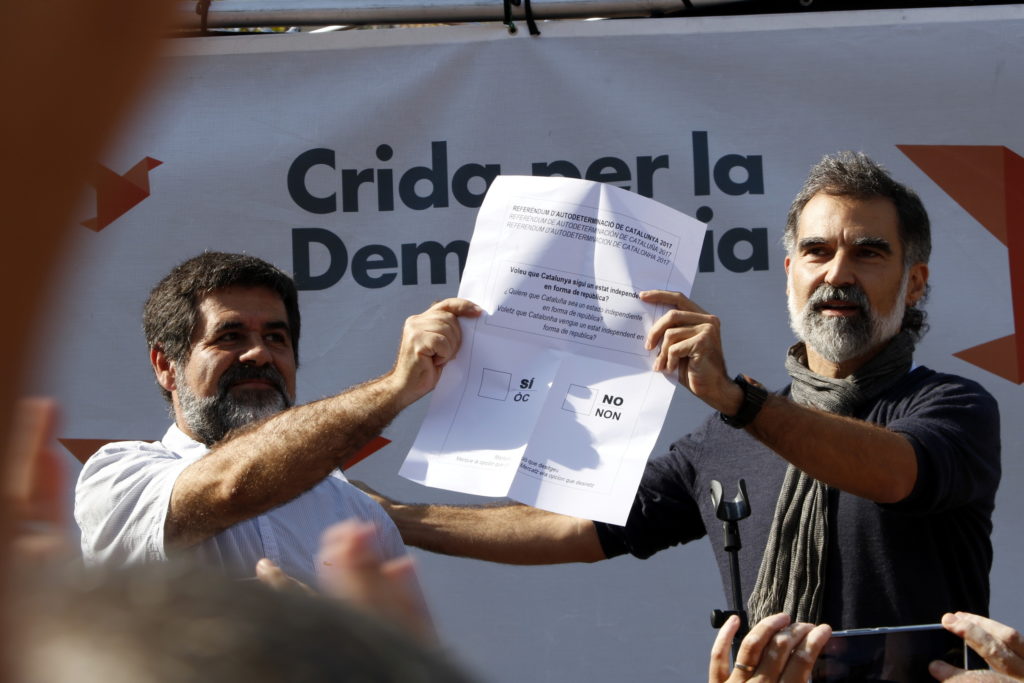18.10.2017 - 15:50
|
Actualització: 18.10.2017 - 22:19
These last few hours we have been perplexed by the imprisonment by Madrid’s National Court of two men who are wholly right —as Raimon, the Valencian songwriter, would put it. The judge’s report that has sent our friends Jordi Cuixart and Jordi Sànchez to jail sends shivers down the spine of those of us who believed in the law as a tool for conflict resolution and, above all, in the need to ensure that the law is always accompanied by democratic principles and guarantees. Yesterday’s decision by judge Carmen Lamela is entirely at odds with democratic justice and contains some elements of the most authoritarian, reactionary judicial tradition ever known to us.
First of all, it is worth mentioning something about this particular court of law, Madrid’s Audiencia Nacional. This is an exceptional court that superseded and became the successor of General Franco’s Court of Public Order, and it has put to trial a good deal of the country’s political dissidence: the anarchists of Operation Pandora, the people behind the Stop the Parliament movement and the anti-royalists who burned photos of the king of Spain. We must always denounce that it is a special court of law, with special prosecutors and special judges, established as the antithesis of judicial independence and impartiality because it centralises the sensitive cases and applies a uniform repressive criterion from a stance that is entirely subservient to the interests of the Spanish government. The political nature of the case is clearly reflected in the choice of crime which Sànchez and Cuixart have been charged with: sedition. It is the same criminal offence that Vic’s CUP councillor faced after he literally said that “you can’t make an omelette without breaking any eggs”.
As lawyers, we are surprised to see Madrid’s Audiencia Nacional in charge of this investigation because Spain’s 1995 criminal code presently lists the crime of sedition under the section of crimes against public order, which means that a Barcelona court ought to hear the case instead. It would only make sense for the Audiencia Nacional to pursue this investigation if it referred to Spain’s 1973 criminal code, which regarded sedition as a crime against the form of government. In my view, this is not a trivial nuance. First of all because the 1973 and the 1995 Spanish criminal codes belong to different legal universes [General Franco died in 1975] and, secondly, because suggesting that the events of September 20 in Barcelona city were either a matter public order or, rather, an attempt against the state provides an insight into how Spain’s justice perceives them.
If we delve deeper into the Franco-era criminal code, another very disturbing detail crops up. As the prosecutor wrote in the preliminary report for this case, the crime of sedition is “a small-scale rebellion as understood in the 19th century”. The prosecution’s statement shows that there is a legal continuity, from the 19th century until today, where Spain’s judiciary fails to distinguish between democratic periods and dictatorial regimes and applies the same law and the same concepts regardless. As a matter of fact, it was the crimes of rebellion and sedition that General Franco’s courts martial charged the defeated republicans with, and eventually led to thousands of death penalties. For this reason alone, such crimes should vanish from any Spanish code of law. But Spain’s 1978 regime has had no shame and no memory for a long time now. Still, the legal neglect that we find ourselves in does not quite end there. At the end of the day, crimes are nothing but empty categories, a chest of drawers of sorts that must be filled with content. Reading judge Lamela’s report, you soon realise that it is the defendants’ political goals that give meaning to the criminal charges filed against them: sedition, rather than a different category, such as disobedience or resistance. In other words, it is the pursuit of a secessionist road map that lands them in jail. The judge is not concerned with whether or not Sànchez and Cuixart —the two Jordis— actually disrupted public order (which they didn’t), but merely with the fact that (according to her) the events of September 20 were another step in the Catalan independence process. This nuance shatters any notion of a legal system based on guarantees. Not only is it perverse and at odds with any democratic legal system, but it drives us into the paradigm of authored criminal law —so typical of authoritarian governments— where, rather than by facts, the interpretation of a crime is supported by ideas. Yesterday the judge literally wrote that:
“[…] the events of September 20 and 21 were not a one-off citizens’ protest, prompted or peacefully convened in disagreement with the police actions instructed by an investigative court of law. Rather, the activities described form part of a complex strategy that the two defendants, Jordi Cuixart and Jordi Sànchez, have been collaborating with for some time with a view to implementing a road map that seeks to achieve independence for Catalonia.”
Between 1930 and 1945, Germany’s great theoreticians of criminal law (from Edmund Mezger to the Kiel school) argued and reasoned all the way to establishing that criminal law had to be a fighting law that allowed to capture the enemy at the outset: when he showed the willingness to commit a crime. Of course, they meant the enemies of Nazism. They set the analogy against the defendant as the interpretation rule, they repealed the principle of personality and they built a monster —like few— that eventually justified the death penalty in cases of “legal enmity”: communism, homosexuality, abortion or affronts to the race. The structural foundations included the culpability “to lead one’s life” which meant that the severity with which the criminal code was applied did not stem from any specific criminal act. Rather, exhibiting a certain leaning was enough to be found guilty and punished. Yesterday Judge Lamela’s report was a first step in that direction because it criminalises conducts which are merely ideological.
Furthermore, her report is so expansive that it constitutes an attack on the taxativity principle (lex certa and, therefore, the principle of legality) when it claims that criminal jurisdiction is applicable, which could lead to punishing anything and everything, no matter how small, provided it is understood as being part of the secessionist road map. And so the general public is left more unprotected, more uncertain and more open to further abuse.
And such legal nonsense only adds to an undetermined, vague case. The judge’s writ ordering Cuixart and Sànchez to be remanded in custody does not clarify the limits of the inquest nor the actual locations (some of the events mentioned occurred in Sabadell, at the CUP’s offices and the PSC’s headquarters) or the time frame (it refers to events prior to September 20, such as an incident in Badalona, and afterwards, like the day of the referendum). It also fails to establish the nature and gravity of the facts, as it mentions everything to do with pro-independence activities. As with the inquest opened by Barcelona’s Court 13 —which prompted the arrests that have brought us where we stand today—, such an all-embracing approach clearly leads to a situation of juridical insecurity. We are not faced with a general cause yet, but it paves the way for that.
In 2006 the Spanish High Court defined Guantánamo’s detention facility as a legal limbo from which nothing could be granted any validity in a democratic context. It went on to establish three characteristics of the enemy’s criminal law: 1) an authored —as opposed to a fact-based— criminal law, 2) the annulment of due process, and 3) the disproportionate penalties established. All these features and many more can be found in the legal response that Jordi Cuixart and Jordi Sànchez have been issued by Spain. They are not in a legal limbo: they have already descended to the legal hell being readied by all those Spanish civil servants, a war from within the law, the enemy’s criminal law, at the new stake built by this new Spanish Inquisition.



